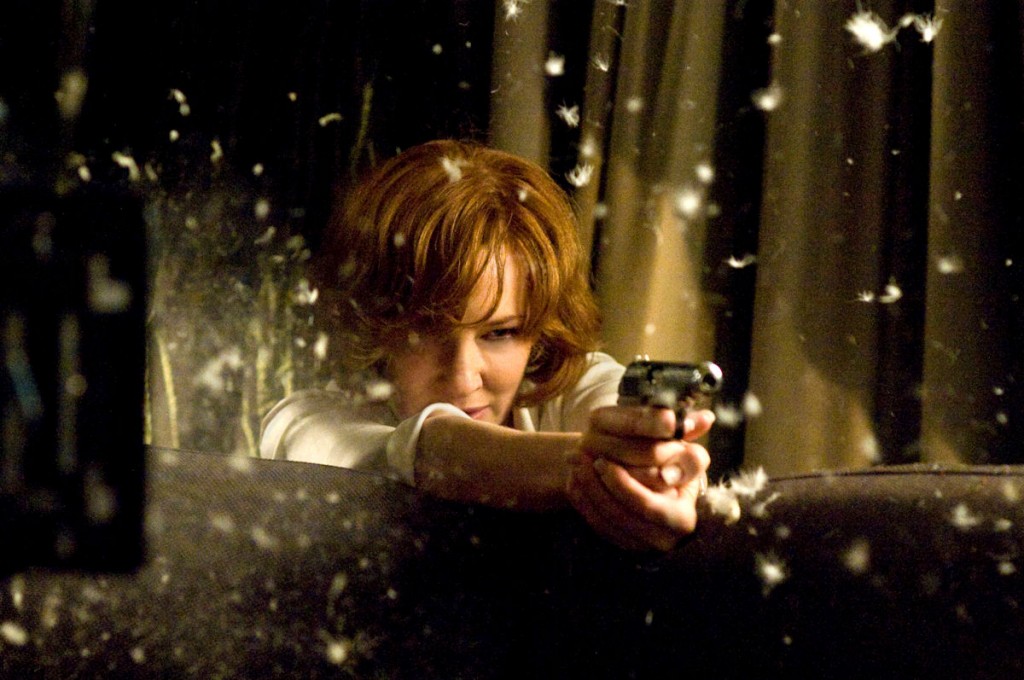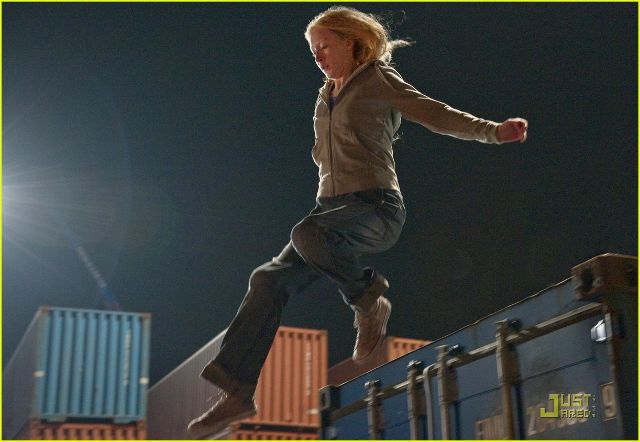(I originally posted this review on my old blog, Magpies Marbles, back on 4/15/2011. It’s a piece of writing I was pretty happy with, and I still think Hanna stands up as one of the best scifi/action films in recent years. I honestly hadn’t seen a film in the SF/F genre pass the Bechdel Test so well and so enjoyably until seeing Frozen recently, which I will also have a review up for soon. I updated this with a few additional thoughts following the original piece. Enjoy.)
Hanna (Focus Features) is one of those rare action thrillers that doesn’t require you to check your brain at the door. In fact, I hesitate to classify it as an action film at all, because despite the modern setting and high tech fight sequences, Hanna is more of a dark fairy tale about the perils of becoming an adult and how the past will always catch up with you.
On the surface, the premise is fairly basic: Twelve-year-old* Teenaged Hanna (Saoirse Ronan) is the only surviving proof of a super-secret US government program to create the perfect soldier through in utero genetic manipulation, so naturally she’s been targeted for elimination by the program’s former director, CIA agent Marissa (Cate Blanchett). Marissa succeeded in killing Hanna’s mother, so Hanna’s spent the last ten years hiding in the woods somewhere in northern Europe with her father, Erik (Eric Bana), who is Marissa’s ex-associate and has trained Hanna as a formidable living weapon with encyclopedic knowledge of the world. Hanna’s given a choice: either remain hidden in the woods with her father, leading a safe and quiet life on the margins of society; or rejoin the world and experience all life has to offer – which also means going to war with Marissa. What follows is a two-fold chase as Marissa hunts both Hanna and her father across international boundaries, in which Hanna learns that life is not as cut-and-dry as facts in a book, and uncovers disturbing questions about her own humanity.
*Hanna’s exact age was never actually determined in the film, but is alluded to being in her early/mid-teens. References to her age in this piece have been corrected to reflect this.
[WARNING: Minor spoilers ahead]
While Hanna doesn’t get points for plot originality, the film gets full credit for its execution of what could easily have been another Bourne Identity clone. Director Joe Wright’s (Atonement, Pride & Prejudice) decision to focus on character development, rather than action sequences, as the driving force in the plot, makes Hanna a solidly enjoyable action-thriller. All too often, films in this genre are awash in stylized violence that exists merely for titillation and shock value rather than enhancing the story. Wright has a deft narrative touch, playing up the fairy tale elements that touch upon the most basic of human experiences: the search for meaning and for one’s place in the world. Hanna is a walking contradiction. She can pull a 200-pound deer home through the snow, fight a person twice her size and tell you exactly how many facial muscles are needed to engage in a kiss, but she’s never heard music, experienced electricity or flirted with a kiss. She’s on the cusp of adulthood and yet she’s never been a normal child. No one, save for her father or Marissa, knows who she is, and so she is free to choose her own identity.
And when I say fairy tale, I don’t mean the sugary-sweet Disney variety – Grimm’s fairy tales are referenced heavily in the film (complete with scene in an actual life-sized “gingerbread house”) and to good effect. Marissa is arguably the wicked stepmother attempting to eliminate the threat to her superiority posed by Hanna; considering the hand she had in Hanna’s creation and her admission that she had made “certain choices” that prevented her from ever having children, there’s the implication that she could possibly be connected biologically to Hanna as well. She’s the evil witch that Hanna has to slay in order for Hanna to reclaim her own life.
Their rivalry makes Hanna rather unique in the world of action films: This is, in fact, the only action-thriller film I’ve seen with not just one, but two female leads, that has very little to do with sex. Neither Hanna nor Marissa utilize sex as a means to an end nor are they dressed in what would be considered sexually provocative clothing (depending on how one feels about power suits). The female leads are not in conflict over a desired relationship or sexual partner, nor are they the object of sexual desire of any of the male leads. Which is not to say that the film is devoid of any sexual tension. For all the threat that Erik supposedly presents to national security, the familiarity he and Marissa seem to share with one another makes you wonder if she might have been more than a little put out that he decided to side with Hanna’s mother to keep Hanna from Marissa’s clutches. Then there’s Hanna – not quite a woman but decidedly not a child, who in the course of one evening goes from nearly receiving her first kiss from a boy to giving her first kiss to her “first real friend” Sophie (Jessica Barden), in scene that is both emotionally charged and laden with innuendo. Everything about Hanna’s identity is a blank slate, even her sexuality.
Given Wright’s background in drama period pieces, he’s an odd choice to direct a modern action-thriller, but Wright, along with script writers Seth Lochhead and David Farr, manage the trick of balancing just enough realism with the inherent fantasy of the film’s premise to make it believable. The fight choreography is both visceral and gorgeous – a chase scene where Hanna attempts to evade her pursuers through a maze of shipping crates is almost a ballet of flesh and steel – but the violence never goes beyond the point in which the audience is jerked into realizing it’s sheer fantasy. The characters are people for whom killing is a grim necessity, not a fetish, and their interactions are correspondingly calculated and efficient in their brutality. The film’s crisply shot fight scenes are a refreshing change of pace from the “shaky-camera” effect, which has it’s place, but I enjoyed actually being able to follow what the combatants in each scene were doing for once. However, there are a few moments where you might find yourself wondering if Wright might have been occasionally enticed to hand over the cinematography reins to the Chemical Brothers (their film score work for Hanna is arguably the best they’ve sounded in years).
The injection of a British family on holiday who take Hanna under their wing also serve as an anchor for the audience, as well as a stark example of all that Hanna has never experienced: the warmth of camaraderie, family and never having to worry about anything more pressing than where the road will take you next or the reoccurring fungal infection on your toe. The film manages to convey the things we take for granted – electric fans, television, friends our own age – as utterly alien as they must seem to Hanna.
Hanna’s success is due in large part to the stellar work of the cast. Young Ronan is a preternatural chameleon in the title role. Her Hanna is at turns feral, vulnerable and a cold-blooded killer. There’s a moment shared between Hanna and the British mother (Olivia Williams), where Hanna leans out the passenger side window of the van, closing her eye as the wind and sun brush over her face. For a moment, she’s just like any other 12-year-old teen on holiday, until she glances in the sideview mirror and realizes they’re being followed. In a blink, Ronan shifts Hanna from ordinary kid to calculated mercenary with impressive subtlety. Blanchett oozes villainy with her steel-gray power suits, honeyed southern accent and a “I’ll knife you as soon as you turn your back” smile. Bana portrays Hanna’s father as appropriately world-weary and resigned and Tom Hollander continues to be the go-to-guy for hair-raising creepy, playing Marissa’s right-hand man who’s willing to do the things the CIA won’t let her do.
Like most fairy tales, what Hanna amounts to is a parable about growing up and the inevitable pain that results in the push-and-pull nature of parent-child relationships. For all that Erik has put into training Hanna as a living instrument of vengeance, you get the distinct impression that he’d much rather they remain in their quiet, secluded lives in the Scandinavian wilds, while within minutes of being introduced to Hanna, we’re given scene after scene in which she argues she is ready to take on her mission. Ultimately, Erik acquiesces to the reality that he can’t keep her under his wing forever. It’s telling that rather than flipping the switch himself, he presents the choice to Hanna and leaves her alone to make her decision. It’s the ultimate gesture of trust between parent and child. If Hanna has any message at all, it’s in Erik’s reply to Marissa’s question as to why he’s re-emerged after over a decade spent in hiding: “They have to grow up sometime.”
(End original post)
Additional thoughts:
A few years later and I continue to be impressed by the structure of Hanna’s story and characterization. For one, the film passes the Bechdel test with flying colors. But what really stands out for me is the amount of agency that Hanna is given throughout the whole story. Which is no small feat considering how little she actually knows of her history because the one person she trusts, her father, withheld the fact that she was the product of bio-engineering experiments and he is not her biological father.
Father-daughter relationships can be tricky to navigate. We’re used to “father knows best” narratives and relationships where men make decisions for women because “they want to protect them” or “they’re only trying to do what’s best” for those women are fairly commonplace.
With Hanna and Erik, however, this dynamic isn’t as problematic as one would expect. Yes, Erik has trained Hanna to her utmost limits, both physically and mentally, honing her into a living, breathing weapon. He trusts her to do her part of their plan, leaving her alone to be discovered by Marisa’s CIA forces. What most stands out, however, is the moment where Erik brings back the black box that will signal their location to the CIA. He doesn’t push the button himself. He doesn’t tell Hanna what he would like her to do. He doesn’t even remain in the cabin while she makes her decision. He leaves it up to Hanna, completely and utterly, removing any pressure, intentional or otherwise, he might convey that would influence her choice. That moment, which comes fairly early in the film, sets the tenor for the rest of the story, one that holds refreshingly firm.



